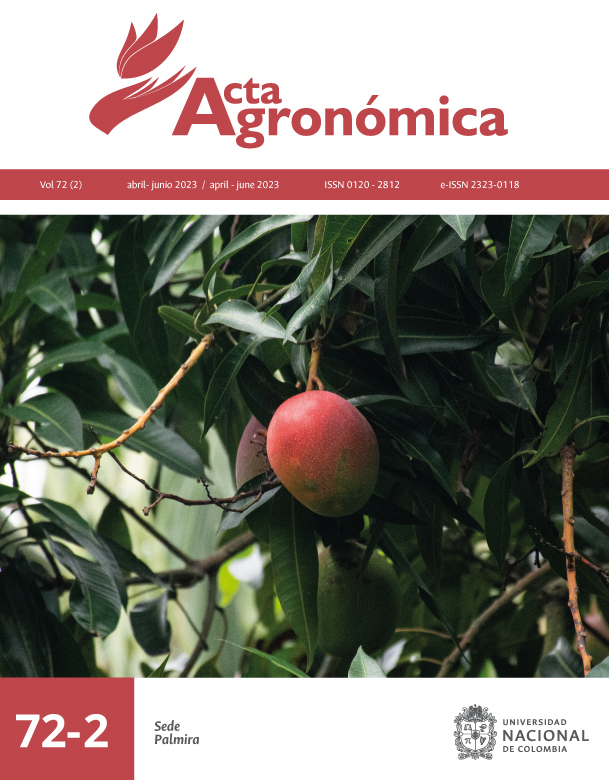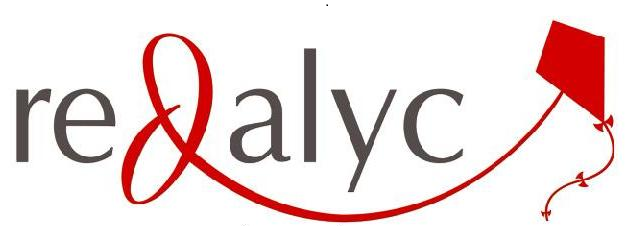Comparison of fructification efficiency between reciprocal crosses in Coffea canephora
Comparación de la eficiencia de fructificación entre cruces recíprocos en Coffea canephora
DOI:
https://doi.org/10.15446/acag.v72n2.97817Keywords:
Conilon coffee, Espírito Santo, genetic parameters, hybrid combinations, number of pinheads (en)café conilón, combinaciones híbridas, Espírito Santo, frutos en formación, parámetros genéticos (es)
Downloads
This study aimed to assess and compare the behavior of superior genotypes of Coffea canephora in terms of fruiting capacity using directed hybridizations in a full diallel design with reciprocals. Hybridizations were performed using 12 possible combinations between genotypes 02, 03, 23 and 83 from the Incaper breeding program. High estimates of the genotypic coefficient of determination in terms of the total number of pinheads per cross (TNP) and fruit set (FS) indicated variability of genetic nature. FS averaged 52,27 %, ranging from 31,32 % to 82,09 %, with the higher rates relating to clone 23 as the male parent. Differences were found between reciprocal crosses in the combinations with genotype 23, which emerged as the donor plant with the best fruiting rate, but poor receiving ability. Clone 83 prevailed as the best receiving plant and the least effective donor. In the comparison of these two genotypes, antagonism was observed in their behavior when they were used as pollen-donor plants (male parents) and pollen-receiver plants (female parents), highlighting their possible maternal effect. Crosses involving clones 02 and 03 showed no differences when used reciprocally. The estimates of genotypic correlations were negative for the four associations involving the FS characteristic, being of greater magnitude with TNP.
Este trabajo tuvo como objetivo evaluar y comparar la eficiencia en la producción de frutos entre cruces recíprocos en Coffea canephora con el uso de hibridaciones controladas en un dialelo completo con diseño recíproco. Las hibridaciones se realizaron involucrando los genotipos 02, 03, 23 y 83 del programa de mejoramiento Incaper. Las estimaciones altas del coeficiente de determinación genotípica para el número total de frutos iniciados por cruzamiento (TNP) y la proporción de frutos (FS) indicaron una variabilidad de naturaleza genética. La FS promedio fue de 52,27 %, con un rango de 31,32 % a 82,09 %, siendo mayor con el clon 23 como progenitor masculino. Se encontraron diferencias entre cruces recíprocos en combinaciones con el genotipo 23, que se destacó como la planta donante con la mejor tasa en la producción de frutos, pero con habilidad receptora deficiente. El clon 83 se destacó como la mejor planta receptora y la peor donante. En la comparación de estos dos genotipos (23 y 83) se observó antagonismo en su comportamiento al ser utilizados como plantas donadoras de polen (progenitores masculinos) y plantas receptoras de polen (progenitores femeninos), evidenciando un posible efecto maternal. Los cruces entre los clones 02 y 03 no mostraron diferencias cuando se usaron recíprocamente. Las estimaciones de las correlaciones genotípicas fueron negativas para las asociaciones que involucraron la característica FS, siendo de mayor magnitud con TNP.
References
Berthaud, J. (1980). Incompatibility in Coffea canephora - test method and genetic determinism. Café, Cacao, Thé, 24, 267-274.
Carvalho, A.; Costa, W. M. and Fazuoli, L. C. (1983). Self-compatibility, yield, peaberry seed an abnormal seedlings in Icatu coffee populations. Bragantia, 42(1), 157-169. https://doi.org/10.1590/S0006-87051983000100014
Charrier, A. and Eskes, A. B. (2004). Botany and genetics of coffee. In Wintgens, J. N. (ed.). Coffee: Growing, processing, sustainable production (pp. 25-56). Darmstadt: WILEY-VCH. https://onlinelibrary.wiley.com/doi/epdf/10.1002/9783527619627.fmatter
Companhia Nacional de Abastecimento (Conab). (2020). Follow-up of the Brazilian coffee crop in Brazil: Second survey. https://www.conab.gov.br/info-agro/safras/cafe/boletim-da-safra-de-cafe
Conagin, C. H. T. M. and Mendes, A. J. T. (1961). Cyto-genetical investigations on three species of coffea: Self incompatibility in Coffea canephora. Bragantia, 20(34), 787-804. http://doi.org/10.1590/S0006-87051961000100034
De Nettancourt, D. (1997). Incompatibility in angiosperms. Sexual Plant Reproduction, 10, 185-199. https://doi.org/10.1007/s004970050087
Cruz, C. D. (2016). Genes Software – extended and integrated with the R, Matlab and Selegen. Acta Scientiarum Agronomy, 38(4), 547-552. https://doi.org/10.4025/actasciagron.v35i3.21251
Ferrão, M. A. G.; Souza, E. M. R.; Fonseca, A. F. A. and Ferrão, R. G. (2017). Autoincompatilidade e produção sustentável do café conilon. In Ferrão, R. G.; Fonseca, A. F. A.; Ferrão, M. A. G. and De Muner, L. H. (eds.) Café Conilon. 2ed. (pp. 177-188). Vitória: Incaper. https://biblioteca.incaper.es.gov.br/digital/bitstream/123456789/3114/1/Livro-Cafe-Conilon-2a-Edicao.pdf
Ferrão, M. A. G.; Ferrão, R. G.; Fonseca, A. F. A.; Verdin Filho, A.C. and Volpi, P.S. (2019). Origin, geographical dispersion, taxonomy and genetic diversity of Coffea canephora. In Ferrão, R. G.; Fonseca, A. F. A.; Ferrão, M. A. G. and De Muner, L. H. (eds.) Conilon Coffee. 3 ed. (pp. 85- 110). Vitória: Incaper.
Ferrão, M. A. G.; Mendonça, R. F.; Fonseca, A. F. A.; Ferrão, R. G.; Senra, J. F. B.; Volpi, P. S.; Filho, A. C. V. and Comério, M. (2021). Characterization and genetic diversity of Coffea canephora accessions in a germplasm bank in Espírito Santo, Brazil. Crop Breeding and Applied Biotechnology, 21(2), e36132123. https://doi.org/10.1590/1984-70332021v21n2a32
Krug, C. A. (1938). Controle da polinização do cafeeiro (Boletim Técnico No. 15). Campinas: IAC. http://www.iac.sp.gov.br/publicacoes
Lashermes, P.; Couturon, E.; Moreau, N.; Pailard, M. and Louarn, J. (1996). Inheritance and genetic mapping of self-incompatibility in Coffea canephora Pierre. Theoretical and Applied Genetics, 93(3), 458-462. https://doi.org/10.1007/BF00223190
Moraes, M. S.; Teixeira, A. L.; Ramalho, A. R.; Espí¬ndula, M. C.; Ferrão, M. A. G. and Rocha, R. B. (2018). Characterization of gametophytic self-incompatibility of superior clones of Coffea canephora. Genetics and Molecular Research, 17(1), gmr16039876. https://doi.org/10.4238/gmr16039876
Oliveira, L. N. L.; Rocha, R. B.; Ferreira, F. M.; Spinelli, V. M.; Ramalho, A. R. and Teixeira, A. L. (2018). Selection of Coffea canephora parents from the botanical varieties Conilon and Robusta for the production of intervarietal hybrids. Ciência Rural, 48(4), e20170444. https://doi.org/10.1590/0103-8478cr20170444
Ramalho, M. A. P.; Santos, J. B. y Pinto, C. A. B. P. (2001). Genética na agropecuária. 2.ed. Lavras: Editora UFLA. https://edisciplinas.usp.br/pluginfile.php/6488029/mod_resource/content/1/Livro%20Gen%C3%A9tica%20na%20Agropecu%C3%A1ria.pdf
Rena, A. B. and Barros, R. S. (2004). Aspectos críticos no estudo da floração do café. In Zambolim, L. (ed.). Efeitos da irrigação sobre a qualidade e produtividade do café (pp. 149-172). https://editoraufv.plataformaneo.com.br/produto/efeitos-da-irrigacao-sobre-a-qualidade-e-produtividade-do-cafe/1109524
Rocha, R. B.; Ramalho, A. R.; Teixeira, A. L.; Souza, F. F. and Cruz, C. D. (2015). Adaptability and stability of Coffea canephora coffee bean yield. Ciência Rural, 45(9), 1531-1537. https://doi.org/10.1590/0103-8478cr20141554
Ronchi, C. P. and DaMatta, F. M. (2017). Aspectos fisiológicos do Café Conilon. In Ferrão, R. G.; Fonseca, A. F. A.; Ferrão, M. A. G. and De Muner, L. H. (eds.) Café Conilon. 2ed. (pp. 103-129). Vitória: Incaper. https://biblioteca.incaper.es.gov.br/digital/bitstream/123456789/3114/1/Livro-Cafe-Conilon-2a-Edicao.pdf
Silva. J. L.; Brennan, A. C. and Mejías, J. A. (2016). Population genetics of self-incompatibility in a clade of relict cliff-dwelling plant species. AoB Plants, 8, plw029. https://doi.org/10.1093/Aobpla/Plw029
Silveira, J. S. M. and Carvalho, C. H. S. (1996). Efeito da época de irrigação sobre o crescimento do ramo plagiotrópico e da longevidade foliar do café conilon. In 22° Congresso brasileiro de pesquisas cafeeiras. Trabalhos apresentados. Águas de Lindóia (pp. 99-100). São Paulo: SDR/Procafe/Embrapa
Souza, C. A.; Vieira, J. R. J.; Santos, M. R. A.; Teixeira, A. L.; Ramalho, A. R.; Espindula, M. C.; Ferrao, M. A. G. and Rocha, R. B. (2019). Caracterização da autoincompatibilidade gametofítica de acessos de banco ativo de germoplasma de Coffea canephora. In X Simpósio de Pesquisa dos Cafés do Brasil. http://www.sbicafe.ufv.br/handle/123456789/12693
Souza, C. A.; Rocha, R. B.; Alves, E. A.; Espindula, M. C.; Ramalho, A. R.; Teixeira, A. L. and Ferrão, M. A. G. (2017). Genetic components for fruit development and ripening of Coffea canephora pierre ex A. Froehner. Coffee Science, 12(3), 355-364. https://coffeescience.ufla.br/index.php/Coffeescience/article/view/1295
How to Cite
APA
ACM
ACS
ABNT
Chicago
Harvard
IEEE
MLA
Turabian
Vancouver
Download Citation
License

This work is licensed under a Creative Commons Attribution-NonCommercial-NoDerivatives 4.0 International License.
Política sobre Derechos de autor:Los autores que publican en la revista se acogen al código de licencia creative commons 4.0 de atribución, no comercial, sin derivados.
Es decir, que aún siendo la Revista Acta Agronómica de acceso libre, los usuarios pueden descargar la información contenida en ella, pero deben darle atribución o reconocimiento de propiedad intelectual, deben usarlo tal como está, sin derivación alguna y no debe ser usado con fines comerciales.






 >
> >
>



















